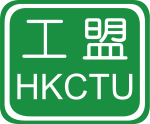Hong Kong Confederation of Trade Unions
Hong Kong Confederation of Trade Unions 香港職工會聯盟 | |
|---|---|
 | |
| President | Pun Tin-chi |
| Chairperson | Carol Ng |
| General Secretary | Lee Cheuk-yan |
| Founded | July 1990 |
| Headquarters | 19/F, Wing Wong Building, 557-559 Nathan Road, Kowloon, Hong Kong |
| Membership | 160,000 |
| Ideology | Liberalism Social democracy |
| Political position | Centre-left |
| International affiliation | ICFTU |
| Regional affiliation | Pan-democracy camp |
| Colours | Green |
| Legislative Council | 0 / 70
|
| District Councils | 2 / 458
|
| Website | |
| www | |
| Hong Kong Confederation of Trade Unions | |||||||||
|---|---|---|---|---|---|---|---|---|---|
| Traditional Chinese | 香港職工會聯盟 | ||||||||
| |||||||||
The Hong Kong Confederation of Trade Unions (HKCTU; Chinese: 香港職工會聯盟) is a pro-democracy labour and political group in the Hong Kong. It was established in 1990. It has 160,000 members in 61 affiliates (mainly trade unions in various sectors) and has representation in the Legislative Council of Hong Kong (LegCo) to challenge government policies and push for legal protection of worker and trade union rights. It is one of the two most influential labour groups in Hong Kong. (The other is the pro-Beijing Hong Kong Federation of Trade Unions).
Beliefs
The principles put forward by the HKCTU are "Solidarity, Rice Bowl, Justice and Democracy". The group focuses on the rights and interests of workers, and the development of a democratic political system in Hong Kong. It calls for the right to collective bargaining and protection against dismissals for involvement in trade union activities.
Besides calling for universal suffrage of the Chief Executive of Hong Kong and LegCo, the group also supports the pro-democracy movement in mainland China, including the struggle for independent trade unions. It participates in a number of human rights and labour rights networks to oppose the suppression of labour movements in mainland China.
History
The HKCTU emerged from the Hong Kong Christian Industrial Committee (HKCIC), a church-sponsored labour organisation largely involved in the grassroots movements in the 1970s and 1980s.[1][2] The Confederation was established in 1990 under the leadership of independent labour leader Lau Chin-shek. It was largely as a coalition of the independent and politically unaffiliated union organisations, most of which were new white-collar unions organising the civil service and professional or service employees in the public and subvented sectors, including the Hong Kong Professional Teachers' Union and the Hong Kong Social Workers General Union.[1]
The HKCTU has inherited the vanguard image and the more liberal sector in the territory's pluralistic union movement. It became a partner and an ally of the pro-democracy camp and the Democratic Party,[1] in which Lau was the founding member. Lau Chin-shek won a seat in the 1991 LegCo direct election and Lee Cheuk-yan, the general secretary of the HKCTU, also won a seat in the 1995 LegCo election.
Days before transfer of sovereignty in 1997, with the support of the pro-democracy camp, the HKCTU successfully established statutory rights of collective bargaining of labour unions, which mandate employers to negotiate with labour unions on issues such as salaries, welfare and working hours, by introducing the Employee’s Rights to Representation, Consultation and Collective Bargaining Bill as Lee Cheuk-yan's private member's bill. But the laws were soon abolished by the pro-Beijing appointed Provisional Legislative Council shortly after the transfer of sovereignty.
Members of HKCTU were involved in organizing a number of local protests, including the pivotal 2003 July 1 march to oppose the enactment of anti-sedition laws under Article 23 of the Basic Law (organized by the Civil Human Rights Front of which HKCTU is a member), and other protests to struggle for labour rights and democracy in Hong Kong and in mainland China.
In the 1998 LegCo election, the group was represented by Lau Chin-shek (also a member of Democratic Party and The Frontier) and Lee Cheuk-yan (also a member of The Frontier) in the Legislative Council (LegCo). In 2012, the HKCTU co-founded the Labour Party.
Notable members
- Federation of Hong Kong and Kowloon Labour Unions
- Hong Kong Social Workers' General Union
- Hong Kong Professional Teachers' Union
- Hong Kong Federation of Domestic Workers Unions
- Union of Hong Kong Dockers
Electoral performance
Legislative Council elections
| Election | Number of popular votes |
% of popular votes |
GC seats |
FC seats |
EC seats |
Total seats | +/− | Position |
|---|---|---|---|---|---|---|---|---|
| 2000 | 96,752 |
7.33 |
2 | 0 | 0 | 2 / 60
|
0 |
5th |
| 2004 | 113,304 |
6.40 |
2 | 0 | 2 / 60
|
0 |
4th | |
| 2008 | 42,366 |
2.80 |
1 | 0 | 1 / 70
|
1 |
— | |
| 2012 | Labour ticket | 0 | 0 | 0 / 70
|
0 |
— | ||
| 2016 | Labour ticket | 0 | 0 | 0 / 70
|
0 |
— | ||
District Council elections
| Election | Number of popular votes |
% of popular votes |
Total elected seats |
+/− |
|---|---|---|---|---|
| 2003 | 4,032 |
0.38 |
2 / 400
|
2 |
| 2007 | 2,273 |
0.20 |
0 / 405
|
2 |
| 2011 | 4,044 |
0.34 |
0 / 412
|
0 |
References
- ^ a b c Hong, Sek Hong Ng (2010). Labour Law in Hong Kong. Kluwer Law International. pp. 227–228.
- ^ Cheng, Chris (4 December 2017). "Declassified: Hong Kong activists failed to broaden support after Tiananmen, governor said in 1989". Hong Kong Free Press. Retrieved 5 December 2017. Governor David Wilson's report to HMG
